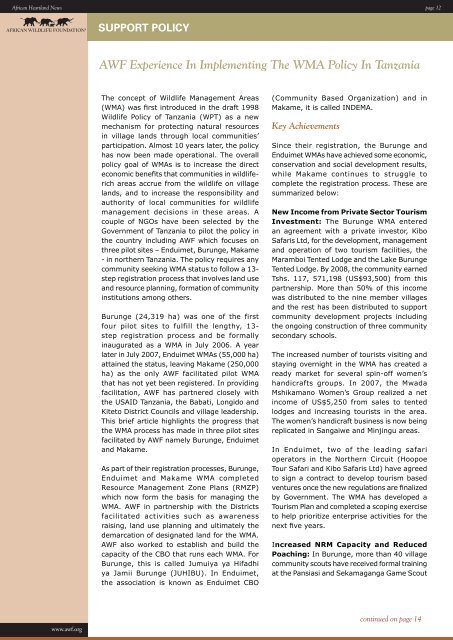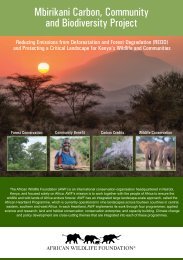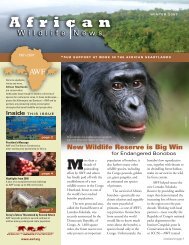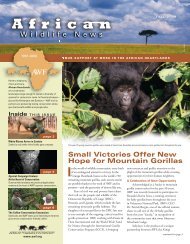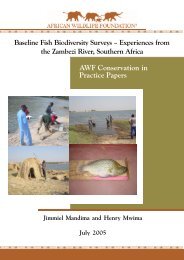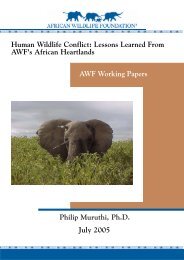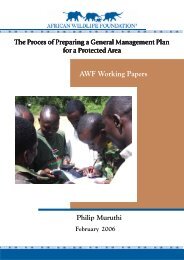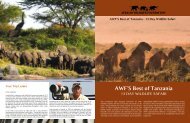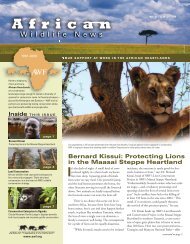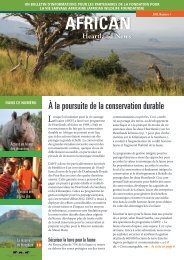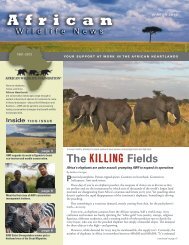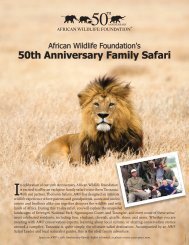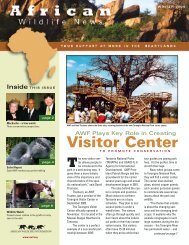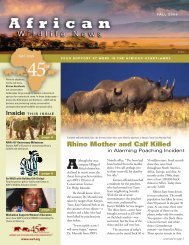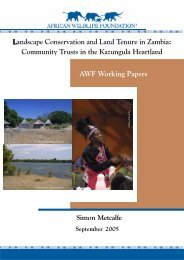Download - African Wildlife Foundation
Download - African Wildlife Foundation
Download - African Wildlife Foundation
You also want an ePaper? Increase the reach of your titles
YUMPU automatically turns print PDFs into web optimized ePapers that Google loves.
<strong>African</strong> Heartland News page 12<br />
<br />
AWF Experience In Implementing The WMA Policy In Tanzania<br />
The concept of <strong>Wildlife</strong> Management Areas<br />
(WMA) was first introduced in the draft 1998<br />
<strong>Wildlife</strong> Policy of Tanzania (WPT) as a new<br />
mechanism for protecting natural resources<br />
in village lands through local communities’<br />
participation. Almost 10 years later, the policy<br />
has now been made operational. The overall<br />
policy goal of WMAs is to increase the direct<br />
economic benefits that communities in wildliferich<br />
areas accrue from the wildlife on village<br />
lands, and to increase the responsibility and<br />
authority of local communities for wildlife<br />
management decisions in these areas. A<br />
couple of NGOs have been selected by the<br />
Government of Tanzania to pilot the policy in<br />
the country including AWF which focuses on<br />
three pilot sites – Enduimet, Burunge, Makame<br />
- in northern Tanzania. The policy requires any<br />
community seeking WMA status to follow a 13-<br />
step registration process that involves land use<br />
and resource planning, formation of community<br />
institutions among others.<br />
Burunge (24,319 ha) was one of the first<br />
four pilot sites to fulfill the lengthy, 13-<br />
step registration process and be formally<br />
inaugurated as a WMA in July 2006. A year<br />
later in July 2007, Enduimet WMAs (55,000 ha)<br />
attained the status, leaving Makame (250,000<br />
ha) as the only AWF facilitated pilot WMA<br />
that has not yet been registered. In providing<br />
facilitation, AWF has partnered closely with<br />
the USAID Tanzania, the Babati, Longido and<br />
Kiteto District Councils and village leadership.<br />
This brief article highlights the progress that<br />
the WMA process has made in three pilot sites<br />
facilitated by AWF namely Burunge, Enduimet<br />
and Makame.<br />
As part of their registration processes, Burunge,<br />
Enduimet and Makame WMA completed<br />
Resource Management Zone Plans (RMZP)<br />
which now form the basis for managing the<br />
WMA. AWF in partnership with the Districts<br />
facilitated activities such as awareness<br />
raising, land use planning and ultimately the<br />
demarcation of designated land for the WMA.<br />
AWF also worked to establish and build the<br />
capacity of the CBO that runs each WMA. For<br />
Burunge, this is called Jumuiya ya Hifadhi<br />
ya Jamii Burunge (JUHIBU). In Enduimet,<br />
the association is known as Enduimet CBO<br />
(Community Based Organization) and in<br />
Makame, it is called INDEMA.<br />
Key Achievements<br />
Since their registration, the Burunge and<br />
Enduimet WMAs have achieved some economic,<br />
conservation and social development results,<br />
while Makame continues to struggle to<br />
complete the registration process. These are<br />
summarized below:<br />
New Income from Private Sector Tourism<br />
Investment: The Burunge WMA entered<br />
an agreement with a private investor, Kibo<br />
Safaris Ltd, for the development, management<br />
and operation of two tourism facilities, the<br />
Maramboi Tented Lodge and the Lake Burunge<br />
Tented Lodge. By 2008, the community earned<br />
Tshs. 117, 571,198 (US$93,500) from this<br />
partnership. More than 50% of this income<br />
was distributed to the nine member villages<br />
and the rest has been distributed to support<br />
community development projects including<br />
the ongoing construction of three community<br />
secondary schools.<br />
The increased number of tourists visiting and<br />
staying overnight in the WMA has created a<br />
ready market for several spin-off women’s<br />
handicrafts groups. In 2007, the Mwada<br />
Mshikamano Women’s Group realized a net<br />
income of US$5,250 from sales to tented<br />
lodges and increasing tourists in the area.<br />
The women’s handicraft business is now being<br />
replicated in Sangaiwe and Minjingu areas.<br />
In Enduimet, two of the leading safari<br />
operators in the Northern Circuit (Hoopoe<br />
Tour Safari and Kibo Safaris Ltd) have agreed<br />
to sign a contract to develop tourism based<br />
ventures once the new regulations are finalized<br />
by Government. The WMA has developed a<br />
Tourism Plan and completed a scoping exercise<br />
to help prioritize enterprise activities for the<br />
next five years.<br />
Increased NRM Capacity and Reduced<br />
Poaching: In Burunge, more than 40 village<br />
community scouts have received formal training<br />
at the Pansiasi and Sekamaganga Game Scout<br />
www.awf.org<br />
continued on page 14


